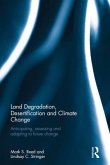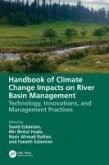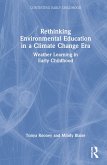Climate Change and Biotic Factors
A Molecular Approach
Herausgeber: Kumar, Amarjeet; Pandey, Saurabh; Singh, Ashutosh
Climate Change and Biotic Factors
A Molecular Approach
Herausgeber: Kumar, Amarjeet; Pandey, Saurabh; Singh, Ashutosh
- Gebundenes Buch
- Merkliste
- Auf die Merkliste
- Bewerten Bewerten
- Teilen
- Produkt teilen
- Produkterinnerung
- Produkterinnerung
Explores how climate change influences the dynamics of pests, diseases, and other biotic stresses, and its role in response of plants and microorganisms. Studies the effects of climate change on pest and disease incidence in crop plants. Discusses the potential of using molecular tools for mitigating ill-effects of climate change.
Andere Kunden interessierten sich auch für
![Biotic Regulation of the Environment Biotic Regulation of the Environment]() Victor GorshkovBiotic Regulation of the Environment168,99 €
Victor GorshkovBiotic Regulation of the Environment168,99 €![Renewable Energy for Mitigating Climate Change Renewable Energy for Mitigating Climate Change]() Renewable Energy for Mitigating Climate Change126,99 €
Renewable Energy for Mitigating Climate Change126,99 €![Land Degradation, Desertification and Climate Change Land Degradation, Desertification and Climate Change]() Mark S ReedLand Degradation, Desertification and Climate Change189,99 €
Mark S ReedLand Degradation, Desertification and Climate Change189,99 €![Handbook of Climate Change Impacts on River Basin Management Handbook of Climate Change Impacts on River Basin Management]() Handbook of Climate Change Impacts on River Basin Management222,99 €
Handbook of Climate Change Impacts on River Basin Management222,99 €![Climate Change and Energy Insecurity Climate Change and Energy Insecurity]() Climate Change and Energy Insecurity190,99 €
Climate Change and Energy Insecurity190,99 €![Rethinking Environmental Education in a Climate Change Era Rethinking Environmental Education in a Climate Change Era]() Tonya RooneyRethinking Environmental Education in a Climate Change Era175,99 €
Tonya RooneyRethinking Environmental Education in a Climate Change Era175,99 €![Displacement, Development, and Climate Change Displacement, Development, and Climate Change]() Nina HallDisplacement, Development, and Climate Change187,99 €
Nina HallDisplacement, Development, and Climate Change187,99 €-
-
-
Explores how climate change influences the dynamics of pests, diseases, and other biotic stresses, and its role in response of plants and microorganisms. Studies the effects of climate change on pest and disease incidence in crop plants. Discusses the potential of using molecular tools for mitigating ill-effects of climate change.
Hinweis: Dieser Artikel kann nur an eine deutsche Lieferadresse ausgeliefert werden.
Hinweis: Dieser Artikel kann nur an eine deutsche Lieferadresse ausgeliefert werden.
Produktdetails
- Produktdetails
- Verlag: Apple Academic Press Inc.
- Seitenzahl: 430
- Erscheinungstermin: 7. Mai 2025
- Englisch
- Abmessung: 234mm x 156mm
- ISBN-13: 9781774918487
- ISBN-10: 177491848X
- Artikelnr.: 72499343
- Herstellerkennzeichnung
- Libri GmbH
- Europaallee 1
- 36244 Bad Hersfeld
- gpsr@libri.de
- Verlag: Apple Academic Press Inc.
- Seitenzahl: 430
- Erscheinungstermin: 7. Mai 2025
- Englisch
- Abmessung: 234mm x 156mm
- ISBN-13: 9781774918487
- ISBN-10: 177491848X
- Artikelnr.: 72499343
- Herstellerkennzeichnung
- Libri GmbH
- Europaallee 1
- 36244 Bad Hersfeld
- gpsr@libri.de
Ashutosh Singh, PhD, is an Assistant Professor at the Centre for Advanced Studies on Climate Change at Dr. Rajendra Prasad Central Agricultural University, Pusa, India. He has more than eight years of experience in plant biotechnology aspects, including plant stress biology, pollen-based selection, molecular marker studies, etc. Currently, he is working on developmental aspects of male gametes under stressful environment conditions. He has published more than a dozen research papers as well as one book and more than 20 popular articles to date. Saurabh Pandey, PhD, is an Assistant Professor at the Department of Agriculture at Guru Nanak Dev University, Amritsar, Punjab, India. He has eight years of experience in plant biotechnology aspects such as plant stress biology, plant virus interactions, abiotic stresses, bio-fortification, molecular marker studies, and metabolism related to the tomato and rice crops. He has published research and review papers as well as book chapters on molecular markers, genomics, plant breeding, and plant molecular virology, catering to the needs of modern agriculture research. Amarjeet Kumar, PhD, is an Assistant Professor in Genetics and Plant Breeding at the College of Agriculture, Central Agriculture University (Imphal), Kyrdemkulai, Meghalaya, India. Dr. Kumar has made over 50 contributions in national and international publications, including research papers, book chapters, review papers, popular articles, and more than 20 research abstracts. Additionally, he has authored two books: Wheat: A Premier Food Crop and Classical and Molecular Approaches in Plant Breeding. He has also delivered talks on radio and television.
Foreword by R. L. Ravikumar Preface Introduction PART I: CLIMATE CHANGE AND
BIOTIC FACTORS: INTRODUCTION 1. Effect of Humidity on Pest and Disease
Incidence in Crops PART II: MOLECULAR MECHANISM OF STRESS TOLERANCE UNDER
CLIMATE CHANGE 2. Molecular Mechanism of Host-Pathogen Interaction in Crop
Plants 3. Insights into the Molecular Mechanism of Plant-Pathogen
Interactions in Fungal Diseases of Crop Plants 4. Molecular Basis of the
Evolution of Pathogens Under Changing Climate Conditions 5. Recent Advances
on the Impact of Climate Change on Host-Plant Resistance and Its Molecular
Mechanisms 6. Reactive Oxygen Species (ROS) and Biotic Stress: Evolving
Roles under Climate Change 7. Molecular Mechanism of Melatonin Interaction
on Biotic Stress Tolerance in Horticulture Crops PART III: ADVANCED TOOLS
AND METHODS FOR CLIMATE RESILIENCE CROPS UNDER BIOTIC STRESS 8. The
Exploitation of Next-Generation Breeding Strategies to Build Biotic Stress
Resilience in Crops 9. Application and Recent Advances in CRISPR-Cas
Editing for Biotic Stress Management in Cereals 10. Recent Advances in
CRISPR-Cas for Biotic Stress Management in Fruits 11. The Role of
Lipoxygenase in Crop Storage Tolerance and Biotic Stress Management 12. DNA
Helicase: The Futuristic Instrument to Increase Biotic Crop Stress
Tolerance 13. Molecular Strategies for Climate Resilient Agriculture in
Cereal Crops and Its Tolerance Mechanism
BIOTIC FACTORS: INTRODUCTION 1. Effect of Humidity on Pest and Disease
Incidence in Crops PART II: MOLECULAR MECHANISM OF STRESS TOLERANCE UNDER
CLIMATE CHANGE 2. Molecular Mechanism of Host-Pathogen Interaction in Crop
Plants 3. Insights into the Molecular Mechanism of Plant-Pathogen
Interactions in Fungal Diseases of Crop Plants 4. Molecular Basis of the
Evolution of Pathogens Under Changing Climate Conditions 5. Recent Advances
on the Impact of Climate Change on Host-Plant Resistance and Its Molecular
Mechanisms 6. Reactive Oxygen Species (ROS) and Biotic Stress: Evolving
Roles under Climate Change 7. Molecular Mechanism of Melatonin Interaction
on Biotic Stress Tolerance in Horticulture Crops PART III: ADVANCED TOOLS
AND METHODS FOR CLIMATE RESILIENCE CROPS UNDER BIOTIC STRESS 8. The
Exploitation of Next-Generation Breeding Strategies to Build Biotic Stress
Resilience in Crops 9. Application and Recent Advances in CRISPR-Cas
Editing for Biotic Stress Management in Cereals 10. Recent Advances in
CRISPR-Cas for Biotic Stress Management in Fruits 11. The Role of
Lipoxygenase in Crop Storage Tolerance and Biotic Stress Management 12. DNA
Helicase: The Futuristic Instrument to Increase Biotic Crop Stress
Tolerance 13. Molecular Strategies for Climate Resilient Agriculture in
Cereal Crops and Its Tolerance Mechanism
Foreword by R. L. Ravikumar Preface Introduction PART I: CLIMATE CHANGE AND
BIOTIC FACTORS: INTRODUCTION 1. Effect of Humidity on Pest and Disease
Incidence in Crops PART II: MOLECULAR MECHANISM OF STRESS TOLERANCE UNDER
CLIMATE CHANGE 2. Molecular Mechanism of Host-Pathogen Interaction in Crop
Plants 3. Insights into the Molecular Mechanism of Plant-Pathogen
Interactions in Fungal Diseases of Crop Plants 4. Molecular Basis of the
Evolution of Pathogens Under Changing Climate Conditions 5. Recent Advances
on the Impact of Climate Change on Host-Plant Resistance and Its Molecular
Mechanisms 6. Reactive Oxygen Species (ROS) and Biotic Stress: Evolving
Roles under Climate Change 7. Molecular Mechanism of Melatonin Interaction
on Biotic Stress Tolerance in Horticulture Crops PART III: ADVANCED TOOLS
AND METHODS FOR CLIMATE RESILIENCE CROPS UNDER BIOTIC STRESS 8. The
Exploitation of Next-Generation Breeding Strategies to Build Biotic Stress
Resilience in Crops 9. Application and Recent Advances in CRISPR-Cas
Editing for Biotic Stress Management in Cereals 10. Recent Advances in
CRISPR-Cas for Biotic Stress Management in Fruits 11. The Role of
Lipoxygenase in Crop Storage Tolerance and Biotic Stress Management 12. DNA
Helicase: The Futuristic Instrument to Increase Biotic Crop Stress
Tolerance 13. Molecular Strategies for Climate Resilient Agriculture in
Cereal Crops and Its Tolerance Mechanism
BIOTIC FACTORS: INTRODUCTION 1. Effect of Humidity on Pest and Disease
Incidence in Crops PART II: MOLECULAR MECHANISM OF STRESS TOLERANCE UNDER
CLIMATE CHANGE 2. Molecular Mechanism of Host-Pathogen Interaction in Crop
Plants 3. Insights into the Molecular Mechanism of Plant-Pathogen
Interactions in Fungal Diseases of Crop Plants 4. Molecular Basis of the
Evolution of Pathogens Under Changing Climate Conditions 5. Recent Advances
on the Impact of Climate Change on Host-Plant Resistance and Its Molecular
Mechanisms 6. Reactive Oxygen Species (ROS) and Biotic Stress: Evolving
Roles under Climate Change 7. Molecular Mechanism of Melatonin Interaction
on Biotic Stress Tolerance in Horticulture Crops PART III: ADVANCED TOOLS
AND METHODS FOR CLIMATE RESILIENCE CROPS UNDER BIOTIC STRESS 8. The
Exploitation of Next-Generation Breeding Strategies to Build Biotic Stress
Resilience in Crops 9. Application and Recent Advances in CRISPR-Cas
Editing for Biotic Stress Management in Cereals 10. Recent Advances in
CRISPR-Cas for Biotic Stress Management in Fruits 11. The Role of
Lipoxygenase in Crop Storage Tolerance and Biotic Stress Management 12. DNA
Helicase: The Futuristic Instrument to Increase Biotic Crop Stress
Tolerance 13. Molecular Strategies for Climate Resilient Agriculture in
Cereal Crops and Its Tolerance Mechanism








